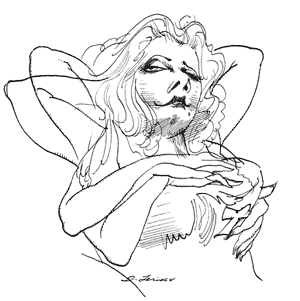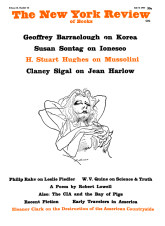Harlean Carpentier, later to become the most popular female film star of her time, was born in 1911 of a conspicuously mismated and middle-class couple. Her father was a Kansas City dentist, her mother a bright-eyed, vapid matron. “It was not until she went to school that she learned her name was Harlean…and not The Baby.”
Mama Jean, as she liked to be called, went off after a peaceful separation and married a sultry Italian con man named Marino Bello, returning with him to Kansas City where Bello fervently began scouting virgin suckers for the Brazilian gold mines and sunken treasure sites he may have believed in. Harlean, the daughter, was raised by her maternal grandfather, a dogmatic old real estate broker. Sam Harlow “took to speaking to her as if she were not in the room” and was the first of several people to totally dominate what remained of her life.
Harlean grew up into a sexy-looking, raucous, not very bright girl who disliked wearing brassieres and liked fondling herself (“I just love them. They’re so beautiful”). Her grandfather, fearing local boys might try with her what was probably on his own mind, deported her to a classy girls’ school in Illinois from which she briefly eloped at sixteen. Marriage annulled, she and Mama Jean and Papa Bello headed, almost by instinct, for that drifters’ and grifters’ Paradise, Los Angeles.
Why and how Harlean “broke into” movies remain obscure. We pick her up in 1927, age sixteen, when her ambition was to commit pratfalls in Laurel and Hardy two-reelers. An agent, Arthur Landau (“he was too good to his clients”), noticed her at a water cooler on the Hal Roach lot at the moment someone was needed to replace the Norwegian actress, Greta Nissen, in Hell’s Angels, stalled in mid-production by the sudden success of “talkies.” The specification was an amiably amoral girl-on-the-town (whore) who puts out for the RAF. “Look at the test again,” begged the agent, “and tell me if she doesn’t look like a good kid.” “But we don’t want a good kid,” said director James Whale. “We want a pig.”
And thus was launched the career of our first real successor to Theda Bara. Toward the end, Harlow had to be forcibly dragged from her bed and into a limousine by a secretary and Mama Jean, slapped and rubbed out of the stupor which had become her only reply to life, and bodily pushed in front of the cameras. The author does not record whether she ever asked to be let alone. It is recorded, however, that she was a “regular guy” on the set.
Jean Harlow became the Elizabeth Taylor of her day, the butt of the national dirty joke at a time when her private life was grisly and joyless. Nobody seemed to understand why Harlow compulsively preferred taxi-drivers and door-to-door salesmen to what was being laid on for her in the movie industry. Only Garbo, in this period, proved tough enough to take the shit, survice, make money and escape in time. Garbo was blessed with peasant blood and a truly off-putting array of self-protective eccentricities (the diet, the privacy). She also knew how to choose her man to protect her self-protection. Harlow, the Kansas City girl, was too American to live.
The supplied, and possibly reasonable, assumption is that the country, at the height of its Depression, “needed” an unbeautiful, pert sex thing full of optimistic vitality. (See Blonde Bombshell.) The operative word is, of course, thing. Long before her “discovery.” Jean Harlow had been maneuvered into assuming the status of object, of thing. Hollywood finished the job. It remained for a Mr. Irving Shulman, himself a former screenwriter and now on the faculty of California State College at Los Angeles, to wrap it up. His way of attempting to match the natural, slangy vitality of his subject (“she fell on her ass in Pittsburgh” “she had a pair as big as a zeppelin…the Harlow bombs”) is slightly mitigated by the possibility that Harlow barely existed except as she saw herself through the eyes of others. One cannot tell from the vindictive and colorless writing.
Almost as soon as it began, Harlow’s career splintered into a mad operetta written by Capra, directed by Nabokov, edited by Sammy Glick. “Jean, how do you like to wake up in the morning?” She yawned and smiled. “I like to wake up feeling a new man.” Such was the mechanized drollery hired gag writers prepared for her press conferences. She appears to have been eminently capable of this kind of thing on her own, but her own was exactly what her owners, Howard Hughes and then L. B. Mayer, were afraid she might inadvertently come into. Miss Kim Novak, years later, was to articulate this treatment in a way Jean Harlow lived in too unsophisticated and un-Frommian a time for. You’re nothing more than “a piece of meat. They seem to delight in cutting you down…they say it’s to keep you from getting a swelled head…but I think it’s their attempt to starve you in the heart.”
Advertisement
Harlow didn’t have a chance. Mama Jean and Marino Bello to leach and guard her, L. B. Mayer for a boss, a near-albino skin that burned terribly in the southern California sunshine, an agent of whom “Good practice demanded that he smile pleasantly at the dirtiest enquiry about her,” and three bad marriages. The dentist’s daughter from K. C. married two soft-spoken Jews from the industry, the first of whom shot himself. Mr. Shulman goes into brutal detail over the reasons.
Though Mama Jean and Papa Bello are written as the villains of the piece, and to a large extent were, they also emerge as people less than wholly ignoble when seen against the backdrop of a Hollywood business community which rudely, sentimentally disconfirmed, while exploiting, this stricken, gallant, greedy girl, so eager to be exploited but also to be recognized. At least Marino and Mama Jean wanted something personal out of Harlow, reflected glory and her money. Jean repaid them by hating them and refusing to be parted from them. To the Mayers, Landaus, and Shulmans she was essentially “The Thing.”
Any one or a combination of these petit-Guignol characters could have prematurely killed her. It turned out to be her mother, whose Christian Scientism and general dottiness prevented medical care getting to the star, suffering from a kidney ailment possibly started when her second husband beat her on their wedding night. She died at twenty-six and was laid out for the thousands in a gown of pink mousseline de soie trimmed in hand-painted roses, daisies, and bluebirds. It was the gown she had worn in Libeled Lady. At the funeral Jeanette MacDonald sang “Indian Love Call.”
This Issue
July 9, 1964




